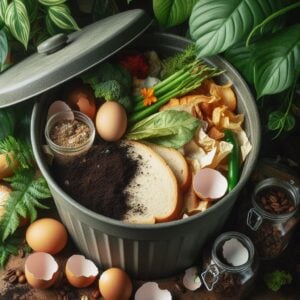Table of Contents
Welcome to the intriguing world of composting, where even your humble loaf of bread plays a starring role. Everyone always asks me if they can compost bread and buns.
I’m here to guide you through the ins and outs of composting bread. It’s a topic that’s simple at first glance but layered with fascinating details, perfect for both green-thumbed beginners and seasoned gardeners.
The Great Bread Debate in Composting
Can you compost bread?
The short answer is yes, but it’s not as straightforward as tossing your stale loaf into the compost bin.
Bread composting is nuanced, blending science, practicality, and a touch of caution.
Related: Can You Compost Potatoes? The Detailed Process
Your Complete Guide to Composting Bread Effectively
Transforming bread into a valuable component of your compost doesn’t have to be complicated. By following these integrated practical tips and steps, you can efficiently compost bread, enriching your garden soil while minimizing waste.
Getting Started: Key Considerations
Before diving into the composting process, it’s crucial to understand a few key aspects:
- Pest Management: Bread can attract pests like rodents. To prevent this, use a compost bin with a secure lid.
- Bread Size Matters: Smaller bread pieces decompose faster and more evenly. Before adding bread to your compost, tear or cut it into smaller chunks.
- Balance in Composting: Bread is high in nitrogen, categorizing it as a ‘green’ compost material. It’s important to balance it with ‘brown’ materials like dry leaves or straw to ensure a healthy compost mix.

Step-by-Step Bread Composting Process
- Prepare Your Bread: Start by breaking down your bread into small pieces. This increases the surface area, making it easier for microorganisms to do their work.
- Choose the Right Spot: Place your compost bin in a location that’s convenient yet away from direct wildlife access. If you’re dealing with pests, consider elevating the bin or placing it on a hard surface.
- Begin with a Layer of Browns: Before adding bread, lay a foundation of brown materials like dried leaves, straw, or shredded paper in your compost bin. This helps absorb excess moisture and maintains aeration.
- Add Your Bread: Distribute the bread pieces evenly over the brown layer. If you have a large amount of bread, avoid adding it all at once; instead, mix it in gradually with your regular composting routine.
- Mix with Greens: Add a layer of green materials, such as vegetable scraps or grass clippings, over the bread. This layer helps balance the nitrogen-rich bread with additional moisture and nutrients.
- Cover with More Browns: After adding your bread and greens, top it off with another layer of brown materials. This not only helps control moisture levels but also deters pests and reduces odor.
- Maintain Your Compost: Regularly turn your compost to aerate it, which speeds up the decomposition process. Monitor the moisture level, adding water if it becomes too dry or more browns if it’s too wet.
- Monitor and Adjust: Keep an eye on your compost over time. If you notice any issues like pest attraction or bad odors, adjust your layers or the amount of bread you’re adding.
Innovative Approaches to Composting Bread
Recent trends in composting have introduced innovative methods like Bokashi, a Japanese technique that ferments organic waste, including bread, before adding it to the compost. This method accelerates decomposition and minimizes pest issues.
Expert Insights
According to Dr. Elaine Ingham, a soil microbiologist, “Composting bread requires a careful balance of ingredients to ensure a healthy decomposition process.” Her research emphasizes the importance of microbial diversity in compost.
Read also: Can You Compost Avocado: The Ultimate Guide To Avocado Composting
FAQ: Composting Bread
Can you Compost Moldy Bread?
Yes, moldy bread can be composted. Moldy bread is a bread that starts producing mold fungus. This type of bread scraps is a good compostable material.
This is because when added to the compost, the bread can increase the number of decomposition microorganisms, which in turn speed up the composting process.
Can you Compost Stale Bread?
Stale bread is a bread waste that is decayed. This type of compostable material has already started decomposing and so when added to the compost, the stale bread is quickly decomposed by the decomposition microorganisms.
Conclusion: Bread in Your Compost, A Balanced Approach
Composting bread is a viable practice, but it requires thoughtful execution. By understanding the science, balancing your compost, and using innovative techniques, you can successfully incorporate bread into your composting routine. Not only does this reduce food waste, but it also enriches your garden, creating a sustainable cycle that benefits both your plants and the planet.
Remember, composting is as much an art as it is a science. Each compost pile is unique, and what works for one gardener might need tweaking for another. So, go ahead, give bread composting a try, and watch as your garden thrives from your sustainable efforts.

